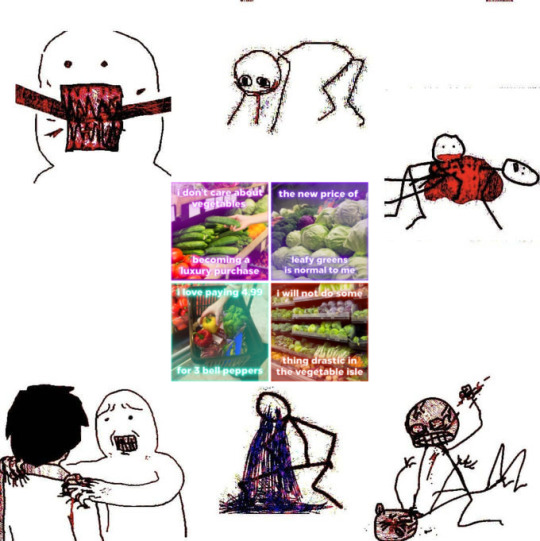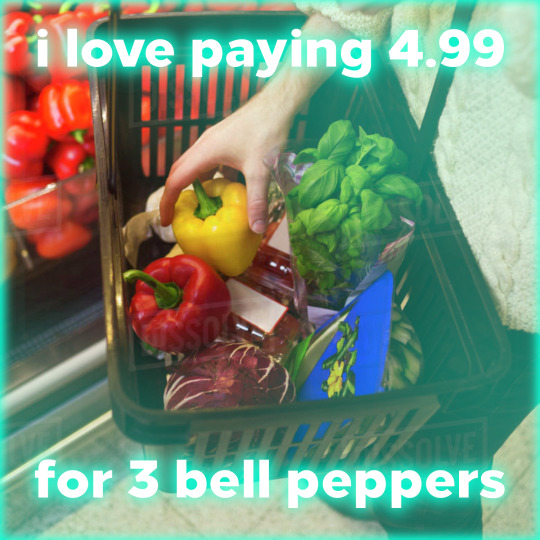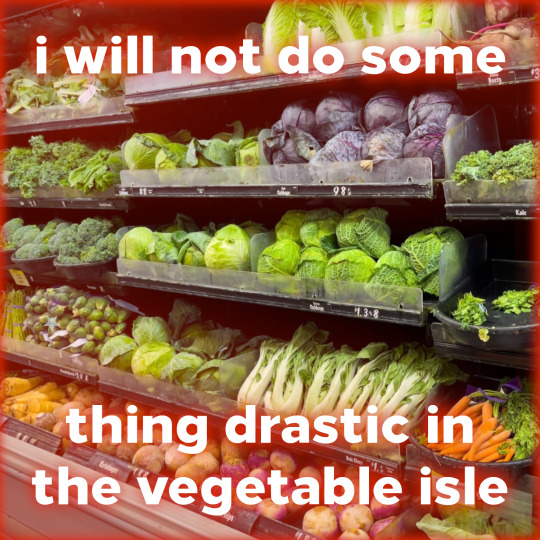#artificial scarcity
Explore tagged Tumblr posts
Text
217 notes
·
View notes
Text
In an apocalyptic society where there aren't enough resources for everyone and it's impossible to ensure everyone's survival, some people may have to be sacrificed.
And when that happens, your survival depends on convincing society that someone else should be sacrificed instead of you. Someone else just wanting to survive is a direct threat to your survival. Being able to convince everyone that you're superior to others is an important survival skill. Being able to find a convenient scapegoat is an important survival skill.
And some people never grow out of that. Even when the apocalypse is over and it becomes possible to ensure everyone's survival, those who mastered the "kill them and not me" skill don't want to let go of it.
So they actually feel good when poor people or disabled people are left to die. They actually feel good when people of color are jailed or murdered by the police. They think "if it happens to them, it won't have to happen to me". They'll gladly suffer as long as they have the reassurance that someone else is suffering more.
People with power then create artificial scarcity in order to make sure this continues happening.
134 notes
·
View notes
Text

Artificial scarcity makes you dependent
#Artificial scarcity makes you dependent#scarcity#artificial scarcity#poverty#homeless#food waste#class war#eat the rich#eat the fucking rich#anti police#anti cop#anti capitalism#antifascist#antiauthoritarian#antinazi#anti colonialism#anti colonization#anti imperialism#ausgov#politas#auspol#tasgov#taspol#australia#fuck neoliberals#neoliberal capitalism#anthony albanese#albanese government#the hunger games#fear and hunger
5 notes
·
View notes
Text
Yet it is capitalism, with its demands for unlimited maximization of profits and economic growth, that is fundamentally unable to protect the Earth's environment. Both humanity and nature become objects of exploitation under capitalism. Furthermore, the artificial scarcity created by capitalism renders large parts of humanity destitute. Slow Down by Kohei Saito
#quotes#21st century#nonfiction#kohei saito#slow down#capitalism#capitalism is the problem#environmental damage#poverty#profit#economic growth#artificial scarcity#exploitation
6 notes
·
View notes
Text
We have the resources to ensure that everyone has access to food, shelter, education, medical care, and transportation. Defending the system as it is now is effectively saying “you don’t deserve a comfortable life if you don’t spend most of it padding shareholders’ pockets”.
14 notes
·
View notes
Text
Small Improvements in Modern Life #1: Taco Tuesday is Liberated
The trademark on the phrase "Taco Tuesday" is officially surrendered.
3 notes
·
View notes
Photo





made some affirmations for my fellow grocery shoppers out there
#fuck capitalism#guillotine the rich#antiwork#gentrification#?#food tw#guiltyedits#artificial scarcity
91K notes
·
View notes
Text
#artificial scarcity#Bitcoin#blockchain#carbon offsets#climate crisis#cryptoart#cryptocurrency#economics#energy consumption#environment#environmental policy#Ethereum#fungibility#futures speculation#greenwashing#inequality#liberalism#materiality#NFTs#Ponzi schemes#proof of stake#proof of work#pyramid schemes#reformism#scarcity#smart contracts#social justice#speculation#sustainability#technology
0 notes
Text
There are actually plenty of global stockpiles of oil, enough for gasoline to be much cheaper than it is in a truly free market, but beyond organizations like OPEC creating artificial scarcity, chemical companies use it to make a shit ton of the chemicals that are put in American food, when there are better alternatives that serve the same purpose, and would actually be cheaper if these better alternatives were used by the large food product conglomerates, instead of them purchasing petroleum that’s used for food product chemicals instead of using it to make gasoline or engine oil.
#oil#oil industry#stockpiles#gasoline#free market#OPEC#artificial scarcity#chemical companies#chemical industry#food industry#food conglomerates#petroleum#petroleum industry#engine oil#motor oil
1 note
·
View note
Text
Just because you make something illegal it doesn't mean that it'll totally disappear. All it does is drive it *further underground* where it's harder to find and regulate. (Or at least moderate/mitigate. Look at how abortions have actually *increased* even though they're supposedly "banned" now.) My guess is that making p0rn will become more localized (like the manufacturing of meth has across parts of the South) and it'll be *easier* to make child p0rn *because* it will have been driven so far underground and, thus, become *more* attractive to those who want to taste a more forbidden fruit.
Well shit, the Republicans brought a certain anti-online porn bill back to the table.
The Interstate Obscenity Definition Act.
This should alarm you guys.


41K notes
·
View notes
Text
Greed and Global Artificial Scarcity-
#Greed #Power #Control #ArtificialScarcity #GlobalTrade
0 notes
Text
I was subbing in for Social Studies today and they had this written in the textbook: “The central idea of economics is to solve the problem of scarcity.”
IT IS??? CAUSE IT SURE DOESN’T FEEL LIKE THAT LOOKING AROUND
#economics#scarcity#artificial scarcity#diamond#but the suffering makes them more valuable!#substitute teacher#what am I teaching these kids?
1 note
·
View note
Text
youtube
Artificial Scarcity thrashing it up at Haus in Philly last week!
#Artificial Scarcity#grindcore#Haus of Yarga#live music#Philadelphia#Distortion MTL#South of the Border#Youtube
3 notes
·
View notes
Note
Want to expand on the library part:
There need to be more spaces where people are just allowed to BE - absolutely no reason or justification or anything required.
Not just places to be without buying stuff - though that is an enormous problem - places where your presence is not itself something you should need to explain - like no one would ask what you’re doing in say, a grocery store.
In the US at least, there’s very few spaces where people can be, no questions asked, and libraries are most of them. They should not only be available 24/7 and funded/staffed accordingly, they would be good candidates to have other public services available from as well.
Or to put it another way, libraries should become parts of these other facilities as we make our infrastructure more functional. The resources they provide should be accessible in the dorms, in the post offices, in hospitals, in care facilities, public food distribution centers, etc. There should be a small library services station in every public park above a certain size/traffic threshold.
In actual full service libraries, there should be even greater access bc they have room for physical media, meeting spaces, etc.
For that to work long term we need the rest, too. We need to start thinking of survival as a baseline that all people are entitled to, not something they have to fight to deserve or justify. Postal/address access is a FANTASTIC early step. Massive library access and resources expansion would be a HUGE intermediate step. In a world where people have a safe place for whatever money they have, the right and opportunity to be in safe, resource-rich areas if they have problems with their living spaces or limited entertainment or harsh weather or limited job prospects - that makes it a little more likely that they’ll be able to make meaningful changes AWAY from those problems.
People who aren’t in a constant struggle to exist make healthier choices, and people who have hope of improving their circumstances have less stress, better mental health, and are far less susceptible to the scams/mental bandaids that take advantage of desperation. (I’m including harmful drug use, addiction, but also the way adults become trapped in abusive family or work situations).
Thing is, these things have momentum if you let them. The less desperate they are, the less invested most people are in keeping resources away from others, and the less grasping they become about sharing their own. The fact that so many of us even *care* whether “someone might take more than they neeeeeed!” Is a worry that only occurs to someone who feels that anything given to one person is in some way being deducted from what’s available to them. The resources are not infinite, but there’s definitely enough that everyone can get what they need to start and then keep making better choices.
dare I ask your opinions on reproductive rights 👀
???????????????
I can't tell if this is some kind of weird bait because my opinions on reproductive rights are not something that I'm particularly quiet about.
#human enrichment#late stage capitalism#human culture#ubi#internet culture#free the feed#public libraries#public spaces#public transportation#public resources#artificial scarcity
6K notes
·
View notes
Text
Business and Economics in Wonka (2023)
I was watching the 2023 Wonka movie last night, and I was struck by the idea that the chocolatiers working against Willy Wonka provide a great example of several business concepts that I remember studying. It’s not always easy to spot concepts like an oligopoly, price fixing, and artificial scarcity in real life; but Wonka provides us with an excellent fictional example to learn from. The three…

View On WordPress
#artificial scarcity#business#business students#economics#educational#market disruption#market structure#movie review#price fixing
0 notes
